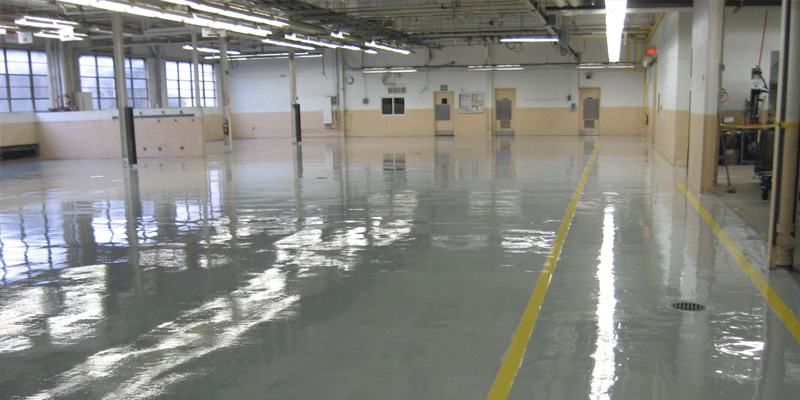Table of Contents

Does your home have concrete or hardwood floors? Or are you thinking about installing these types of floors? If so, you’re going to want to know about floor coating sealers. Floor coating sealers protect your floors from damage caused by water, dirt, and other debris. They also make it easier to clean your floors and keep them looking like new.
There are many different types of floor coating sealers on the market, so it’s important to choose the right one for your needs. This guide will discuss the top ten types of floor coating sealers and help you determine which one is right for you.
1. Water-Based Sealer
If you’re looking for a floor coating sealer that’s easy to apply and quick to dry, a water-based sealer is a good option. Water-based sealers are also low odor and non-toxic, making them safe for use in homes with children or pets. However, water-based sealers don’t provide as much protection as other sealers and will need to be reapplied more frequently.
2. Solvent-Based Sealer
Solvent-based sealers provide more protection than water-based sealers and can be used on various flooring materials, including hardwood, laminate, and tile. Solvent-based sealers are also more durable and longer-lasting than water-based sealers. However, they have a strong odor and can be toxic, so they’re not a good choice for homes with children or pets.
3. Oil-Based Sealer
Another popular type of floor coating sealer is oil-based. These are most common in high-traffic areas, such as commercial kitchens and hospitals, because they’re very durable. However, oil-based sealers can be difficult to apply and have a strong odor.
4. Epoxy Sealer
Epoxy sealers are another good option for high-traffic areas. They provide a durable, long-lasting finish that’s easy to clean. These types of floor coating sealers are unique in that they’re actually two parts that are mixed together before being applied to the floor.
5. Urethane Sealer
Urethane sealers are similar to epoxy sealers in that they provide a durable, long-lasting finish. They are a popular option among home and business owners due to the fact that they’re easy to apply and don’t have a strong odor.
6. Acrylic Sealer
Acrylic sealers are the most popular type of floor coating sealer. They’re affordable, easy to apply, and provide a high-gloss finish that’s easy to clean. However, acrylic sealers aren’t as durable as other types of sealers and will need to be reapplied more frequently.
7. Penetrating Sealer
Penetrating sealers are designed to penetrate deep into the pores of the flooring material, providing long-lasting protection. They’re a good choice for floors that are prone to staining, such as concrete or stone. However, penetrating sealers can be difficult to apply and are not recommended for use in high-traffic areas.
8. Surface sealer
Surface sealers are the easiest type of floor coating sealer to apply. They provide a thin, protective layer that’s easy to clean. However, surface sealers don’t provide as much protection as other types of sealers and will need to be reapplied more frequently.
9. Polyurethane Sealer
Polyurethane sealers are one of the most popular types of floor coating sealers. They’re durable, long-lasting, and easy to apply. However, polyurethane sealers can turn yellow over time and are not recommended for use in high-traffic areas.
10. Acrylate Sealer
Acrylate sealers are similar to acrylic sealers in that they’re affordable and easy to apply. However, they provide a more durable finish that’s resistant to staining and fading. Acrylate sealers are also less likely to yellow over time. This makes them extremely popular in high-traffic areas.
When it comes to choosing a floor coating sealer, there are numerous factors to consider. The type of flooring you have, the amount of traffic your floors see, and your budget will all play a role in determining which sealer is right for you. With so many options on the market, it’s important to do your research and choose a sealer to provide the protection you need.
Frequently Asked Questions About Floor Coating Sealers
1. What is the best type of floor coating sealer?
The best type of floor coating sealer will vary depending on your individual needs. If you have a large budget and are looking for a long-lasting, durable finish, epoxy or urethane sealers are a good option. For an easy-to-apply, affordable sealer, acrylic is a good choice. Penetrating sealers are ideal for floors that are prone to staining, while polyurethane is a popular option for high-traffic areas.
2. How often do I need to apply floor coating sealer?
The frequency with which you’ll need to apply floor coating sealer will depend on the type of sealer you use. Acrylic and acrylate sealers will need to be reapplied more frequently than other types of sealers, while epoxy, urethane, and polyurethane can last for several years.
3. Will floor coating sealer yellow over time?
Some types of floor coating sealers, such as polyurethane and acrylic, can yellow over time. Acrylate sealers are a good option if you’re concerned about this happening.
4. Can I use floor coating sealer on my kitchen floors?
Yes, floor coating sealer can be used on kitchen floors. However, it’s important to choose a sealer that’s resistant to staining and fading, such as acrylate or urethane.
5. I have pets. Do I need to use a special type of floor coating sealer?
If you have pets, it’s important to choose a floor coating sealer that’s durable and easy to clean. Acrylic, acrylate, and urethane sealers are all good options.
6. How do I apply floor coating sealer?
The application process will vary depending on the type of sealer you use. Most sealers can be applied with a brush, roller, or sprayer. However, some types of sealers, such as penetrating sealers, can be difficult to apply and may require special equipment.
